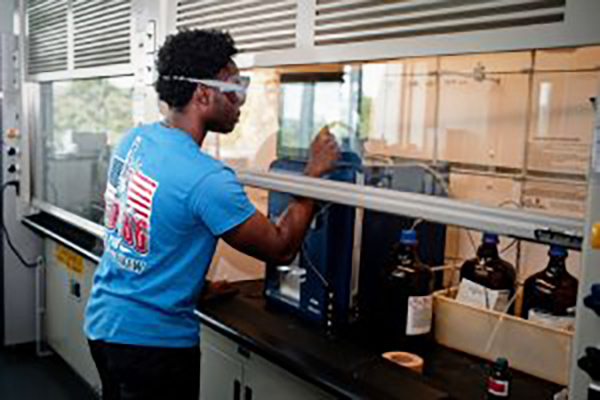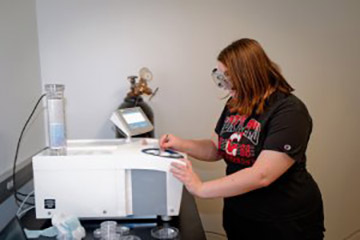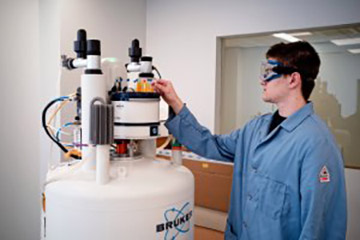
08/27/2024
Nine SUNY Cortland chemistry students explored the cutting edge of science this summer, working full time on research projects made possible by outside grants and donations.
By spending full days working with faculty mentor on experiments, undergraduates receive an educational experience that will be an immense help academically and for a career, said Professor Frank Rossi, chair of the Chemistry Department.
“It’s a rule of thumb I use that one week in the summer is the same as doing research over an entire semester during the academic year, because it’s focused,” Rossi said.
“It’s 8 hours, a full workday, five days a week,” Rossi said. “Hands on, one-on-one with your faculty mentor. ... You’re learning what it’s like to be investigating an original research problem, which is very different than a classroom activity.”
The value lies in an opportunity for the students to be dedicated to one subject, as well as the creative thinking required to find results in the lab that neither the students, mentors nor textbooks know ahead of time. Without other classes, athletics and other activities, the experience more closely mimics what students will do in a job or in graduate school.
This summer’s student chemistry researchers were Evan Beaudry, Bradley Blake, Tazio Cutrona-Bouillon, Chris Faherty, Dustine Izzo, Sarah Kono, Odurosi Kwarteng, Alex Rash and Sean Zupko.

Photo by Jeffrey Werner
Funding for the Chemistry Department’s projects came from external grant groups including the National Science Foundation and Organic Syntheses, money through the Undergraduate Research Council and local fellowships. Two additional students gained the chance through $6,500 in donations to the Chemistry Department’s general fund during the last Cortland Challenge fundraiser.
The Undergraduate Research Council offers a limited number of summer research opportunities to applicants. The projects require that a formal proposal and faculty mentor be accepted by the council. If approved, a stipend is given to the students, along with free on-campus housing.
This year, the assistance let every student who wanted a research experience in Rossi’s department to have one.
One donor gifted money to sponsor students interested in a career in education. For grads who pursue teaching, their summer research gives them another key bit of help in their future career — time as both an observer and a practitioner.
“They’re going to think more about what we do as a scientific community,” Rossi said of the student participants. “They’re part of the story when they’ve done research themselves, which is valuable.”
This kind of education that goes above and beyond the normal school experience is one of the most valuable possible when it comes to development, Rossi noted. Even better, he said, is that all three focus areas in his department — chemistry, biochemistry and adolescence education: chemistry (7-12) — were able to join in the program due to the financial help.
Kono, a junior from Ithaca, N.Y., plans to go to graduate school and pursue cosmetic chemistry. This was her second summer doing research at Cortland, the first supported through the NSF’s Louis Stokes Alliances for Minority Participation, and this year through Cortland’s Dr. Arden P. Zipp Summer Research Fellowship.

Photo by Jeffrey Werner
“I am fascinated by the production of medicinal cosmetic products, and I want to contribute in that field in the future," Kono said. "I’m also interested in learning more about the effect of cosmetic products over the environment in order to create better products for both people and the natural world.”
She described her time in the lab this summer as making her feel independent, with a lot of responsibility to manage.
“I learned so many new laboratory skills through actual practice supervised by my professors, which gave me more confidence in working alone on an experiment,” Kono explained. “I believe that I was able to learn so much more than through regular lab classes because I had more time to work on a project, opportunities to ask questions, and repeat the experiments.”
Assistant Professor Sarah Wolf mentored Kono, Faherty and Izzo. Their projects all focused on synthesizing new compounds designed to investigate the behavior of a class of materials known as amorphous solids. Otherwise known as glasses, they’ve been shown to have uses in the pharmaceutical industry, solar panels and thermal protection.
“I witnessed my students grow significantly as scientists and scholars over the course of the summer,” Wolf said. “The skills they gained in lab will serve them well in graduate school or the workforce following graduation. In particular, I have seen them become more inquisitive and independent scientists capable of working their way through challenging and exciting problems in the field.”